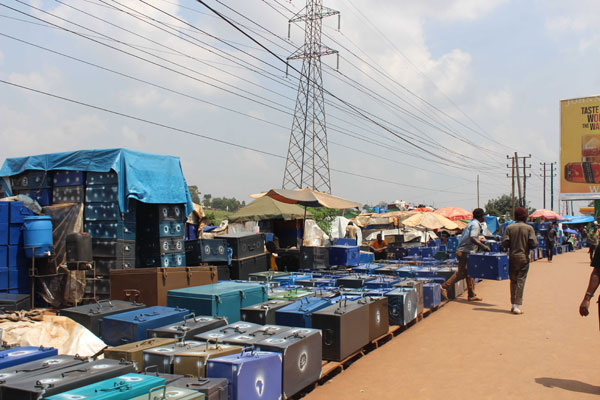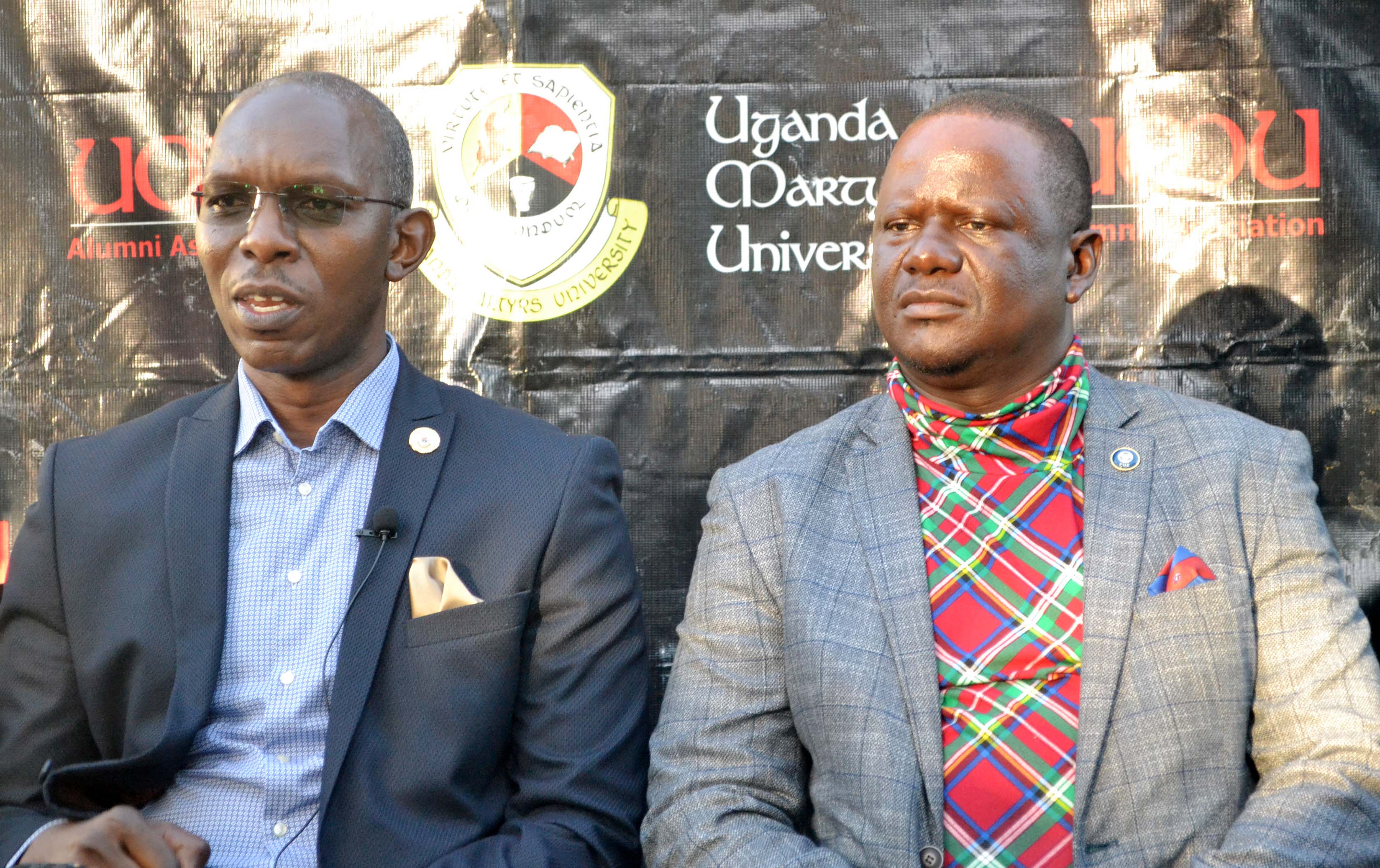
Men look at a metallic case in Nakawa Market. The back to school season requires parents to shop for scholastic materials whose prices have started rising. Business people selling these items are poised to make a killing as parents purchase the school requirements ahead of the New school term one next week. PHOTO/ISAAC KASAMANI
|Prosper
Prime
Economic dynamics of taking children back to school
What you need to know:
- Some parents have to dig so deep in their pockets to the point of ending up in debt just to return their children to school.
Even if the reopening of schools was rightly scheduled shortly after paydays for salaried parents, the pain and cost of sending children back to school is rising.
With inflation in double digit at 10.2 percent, and and supply chain issues lingering, these are not the best of times as school costs keep soaring. Some parents have to dig so deep in their pockets to the point of ending up in debt just to return their children to school.
Despite government’s directive barring schools from making any adjustments as the cost-of-living crisis rages on, schools have still stuck to their rates as communicated to parents at the end of the third term in 2022. The schools say the impending fees hikes are triggered by the current inflationary pressures.
Many have often said January has 90 days while others think it is a year of its own. The reason behind this thinking is that after the December holidays and the spending therein comes the opening of the school year. For some parents, it is the start of a new school hence necessitating them to pay over and above the ordinary school fees.
For others, there is no school requirement to speak of as the child might have either lost most of them in the previous term or worn them out. For others, the uniforms are no longer fitting. It is a sweat breaking moment, to say the least.

Shoe vendors wait for clients to make some back to school purchases in Kampala. PHOTO / JOAN SALMON
All that not withstanding, for some, business is very low that they are hoping against hope that their children return to school. Nonetheless, school must start and to school, the children must go. So, how do parents manoeuvre these visibly murky waters and ensure the children report to school? The first stop was outside Nakawa market where metallic cases are made.
Prices of raw materials rise
Ronald Mwanja makes metallic cases at Nakawa market, and says their prices have increased. For instance, the small one was Shs110,000 in December but now goes for Shs150,000. Then there is one that Mayanja terms as the one ideal for a student going to Senior One and it is now worth Shs200,000 from Shs150,000. Mwanja tags the price increase to esclating prices of raw materials as well as workers asking for a better pay.
“With the release of Primary Leaving Exam (PLE) results, the sheets suppliers started by hoarding, before increasing the prices. For instance, a sheet that was formally Shs110,000 is now Shs135,000,”he says.
Using sheets as those used to build kiosks, Mwanja says they are generally pricey and one sheet only makes one case. In regards to workers, he says that once someone has a skill, it is easy for them to demand for more or they walk. Compounding all those factors, Mwanja says it is hard to keep the prices down.Nonetheless, clients keep coming for which he and his colleagues are thankful.
“Most schools now prefer metallic cases such as Little Muheji Nansana, Turkish Light Academy because these do not break under the weight of items within. Additionally, they are not easily broken into which reduces the theft cases,” he says.
Richard Wasswa, a shoe vendor, says the situation is not good at all because while prices have increased from the supplier side, buyers cannot imagine, say buying a pair of shoes that was previously Shs25,000 at Shs35,000. Unfortunately, they also do not want to buy the used ones which are relatively cheap. “Vendors had invested heavily and with high hopes but the customer scarcity is alarming and worrying,” Wasswa says.
Esther Nabirye, another shoe vendor, laments that money is scarce. “We come out here with the hope of making money to buffer that of our spouses. Previously, we made a ‘killing’ when children were going back to school. However, this time around, customers are so scarce. So, this term, to keep my three children in school, I must have a chat with the headmaster to allow me pay in installments,” she says.

Some of the scholastic materials on sale. PHOTO/JOAN SALMON
Andrew Akankwasa sells scholastic materials and says his hopes after the release of the PLE results was that parents would have hit the market in droves to buy school supplies.
“However, these are still scarce. I still hold on hope that they will start coming in the next few weeks,” he says.
Beatrice Wanyenze runs a grocery stall in Nakawa market.. She looks into the market aisle with the hope of attracting customers. On asking her about how she has planned for the coming week, she smiles but the smile lacked the warmth it deserved. Her first comment, in a rather sad note, was that as of this year, the school where her children go just told them that they would not be accepting cash at school anymore.
“Arrangements with head teachers are seemingly dwindling because we have been told to take all the money to the bank. I do not know if the banks will accept part payments. Otherwise, at the moment, my children may have to wait until I get all the money,” she says.
On asking her if she has any support system for her children, Wanyenze says she is the mother and father therefore, the affairs of her children solely rest on her. shoulders.
“I am the bread winner at the moment, so they will depend on the proceeds from my stall. I cannot even think of borrowing because I have no known avenue for repayment,” she says.
Shopping in phases
Fiona Ruth works at a restaurant and her way of ensuring her children remain in school is by starting to buy school items in phases rather than waiting for the last-minute rush hour which greatly strains her. For example, she has already bought the buckets and basins. In regards to school fees, Ruth says she has opted to go to schools they can afford and accept deposits.
“That way, I can start making deposits long before school opening day. By reporting time, at least, I would have accumulated half of the pay,” she says. Ruth also goes further to hit the Kiyembe stores to buy uniform material, T-shirts, and socks.
“While one metre of school material will cost me Shs10,000, sewing another Shs10,000 and the badge Shs5,000, the school will charge me Shs30,000. With a saving of Shs5,000 on each uniform, that balance will help me get other requirements. On the other hand, socks are at Shs7,000 while a sports T-shirt is between Shs5,000 and Shs10,000 depending on the size in Kiyembe as opposed to Shs15,000, Shs10,000 to Shs20,000 respectively when bought at school,” she says.
Fred Lukyamuzi, a father of eight, resorted to opening up an account with his local grocery shop. Here, he continually deposits money in preparation for school opening.
“The idea of waiting to make a bulk purchase may seem wonderful for many due to price reductions that come with it. However, I have no certainty that I will get all this money in one go. The alternative was to get into an understanding with the shop owner so that I deposit money, something like saving with him. In return, he agreed to keep the prices down for me in reward for my commitment to him. When the money has accumulated, I can get an item or two and continue the saving. That has spared me from the stress seeing that I have a couple of children to cater for,” he says.
While the buzz in arcades and shopping malls is not that high, there is the issue of paying school fees where bank lines are akin to a winding road. Many spend hours on end waiting to pay. However, this is no more as more schools are jumping on the mobile money wagon to ease the pain.
With a code, Joyce Taizawo, a parent says, she can pay up for her children’s fees in the comfort of her home. “The pain of standing in line all day is behind us,” she smiles.





